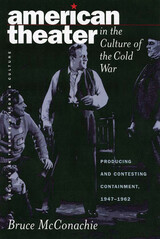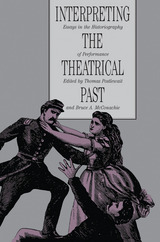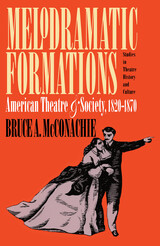3 books about Mcconachie, Bruce A.

American Theater in the Culture of the Cold War
Producing and Contesting Containment, 1947-1962
Bruce A. Mcconachie
University of Iowa Press, 2003
In this groundbreaking study, Bruce McConachie uses the primary metaphor of containment—what happens when we categorize a play, a television show, or anything we view as having an inside, an outside, and a boundary between the two—as the dominant metaphor of cold war theatergoing. Drawing on the cognitive psychology and linguistics of George Lakoff and Mark Johnson, he provides unusual access to the ways in which spectators in the cold war years projected themselves into stage figures that gave them pleasure.
McConachie reconstructs these cognitive processes by relying on scripts, set designs, reviews, memoirs, and other evidence. After establishing his theoretical framework, he focuses on three archtypal figures of containment significant in Cold War culture, Empty Boys, Family Circles, and Fragmented Heroes. McConachie uses a range of plays, musicals, and modern dances from the dominant culture of the Cold War to discuss these figures, including The Seven Year Itch, Cat on a Hot Tin Roof; The King and I,A Raisin in the Sun, Night Journey, and The Crucible. In an epilogue, he discusses the legacy of Cold War theater from 1962 to 1992.
Original and provocative, American Theater in the Culture of the Cold War illuminates the mind of the spectator in the context of Cold War culture; it uses cognitive studies and media theory to move away from semiotics and psychoanalysis, forging a new way of interpreting theater history.
[more]

Interpreting The Theatrical Past
Historiography Of Performance
Thomas Postlewait
University of Iowa Press, 1989
The essays in this broadly based work examine the research procedures, practices, problems, and opportunities in the field of theatre history. No single methodology or theory dominates this anthology; instead it offers various approaches to the study of the theatrical past. It is the first of its kind in theatre historiography, useful for research as well as classroom adoption.
Though these thirteen essays provide historical information on specific people, events, works, documents, institutions, and social conditions in the theatre, they aim primarily to explore theoretical and methodological issues, to review and analyze current research practices and presuppositions, and to identify and apply new theoretical orientations to theatre studies. Whatever their interpretive viewpoint and rhetorical tone, each of the essays calls for greater awareness of the problems and opportunities that face the discipline. Consequently, this collection will be valuable reading not only for theatre historians but for scholars in literary and popular studies and in all the performing arts.
[more]

Melodramatic Formations
American Theatre and Society, 1820-1870
Bruce A. Mcconachie
University of Iowa Press, 1992
The middle years of the nineteenth century were a time of dynamic artistic and social changes in America. Now, Melodramatic Formations is the first study to trace these changes in popular stage melodrama's production, dramatic form, and audience reception. Bruce McConachie shows how the theatrical mutability that characterized the years 1820 to 1870 is inextricably tied to the decline of elite paternalism and republicanism and the rise of bourgeois rationalism and respectability.
Taking a rigorous interdisciplinary approach, McConachie examines several historical regularities of production, genre, and audience. Here theatre (and its drama) has at long last been returned to its general culture, rather than being treated as an isolated phenomenon. Ultimately, he develops a new notion of a theatrical formation—a construct where groups of spectators and theatre performers produce each other as artists-to-be-experienced and audiences-to-be-entertained.
Throughout Melodramatic Formations McConachie illustrates how theatre both maintains and produces various ideologies; he convincingly shows that theatre is a major player in our social and cultural history. This book will be of interest to all in American studies, theatre history, and American cultural history.
[more]
READERS
Browse our collection.
PUBLISHERS
See BiblioVault's publisher services.
STUDENT SERVICES
Files for college accessibility offices.
UChicago Accessibility Resources
home | accessibility | search | about | contact us
BiblioVault ® 2001 - 2024
The University of Chicago Press









